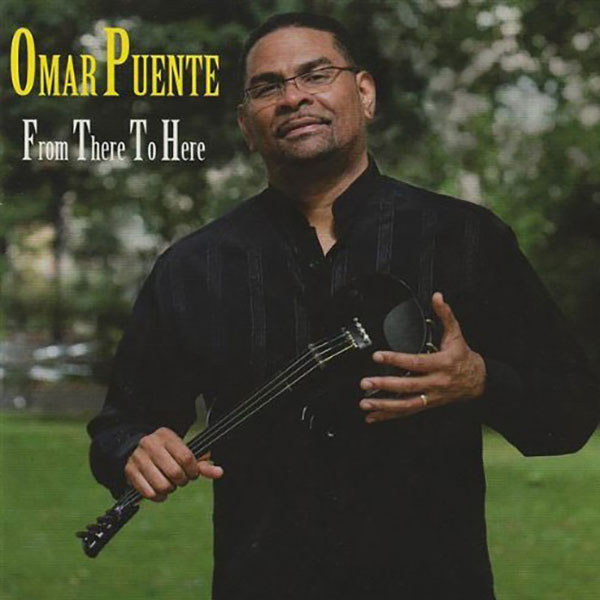
by Ian Mann
November 23, 2009
/ ALBUM
An impressive solo debut, ambitious in scope and featuring some great playing from a star studded line up.
The Cuban violinist Omar Puente, now based in Bradford,Yorkshire is best known for his work as an as an outstanding soloist in Courtney Pine’s “Afropeans” band and for his excellent duo album “Bridges” recorded with pianist Robert Mitchell. In a non musical context he has attracted the attention of the media as the husband of multiple sclerosis sufferer Debbie Purdy whose high profile court case regarding self administered euthanasia abroad made headlines earlier in the year when the Law Lords ruled in Purdy’s favour.
But is is Puente the musician who concerns us here. Released on Pine’s Destin-E label (the saxophonist both plays on and produces the record) “From There To Here” is a musical odyssey that traces Puente’s journey from Cuba to Britain whilst examining his African roots along the way. Puente’s informative liner notes provide further illumination and a large cast of musicians explore various musical styles with Cuban culture always at it’s heart.
Despite his classical training Puente’s principal instrument is the electric violin, although he does also appear here on the acoustic model. The amplified instrument allows him to feature in large ensembles such as Pine’s (and indeed some of the groupings here) and to actually be heard. He has a distinctive, surprisingly large sound on the instrument that always cuts through, whatever the context he finds himself in.
That is certainly the case on the attention grabbing opener “My Mrs.” where Puente lets rip on his ZETA Strados electric violin above Mitchell’s exuberant piano and a forest of Cuban percussion courtesy of drummer Michel Castellano and conga player Oscar Martinez.
The charming “Somebody Backstage (Danzon)” is more song like and pays tribute to Puente’s road crew and others. It’s a two part composition and features vocals in the more up tempo second “salsa” section. Mitchell and Oscar Martinez are once again prominent in the arrangement and Pine weighs in on flute.
The ambitious “Rumbiando” features a large ensemble and is skilfully and tightly arranged. Classical flourishes ,Puente appears as part of a string quartet as well as playing his more usual electric instrument, mix with native Cuban styles in a surprisingly effective melange. The influence of Chinese immigration on Cuban music is also acknowledged. Puente himself and Dennis Rollins’ warm, rich, rounded trombone take the solo honours.
“Just Like U” blends some of the key elements of Cuban music in thrilling fashion. Spanish guitar as played here by Cameron Pierre combines with the African rhythms generated by Castellano, Oscar Martinez and bassist Jimmy Martinez. Pine’s squiggling soprano sax throws some jazz flavourings into the pot (Thelonious Monk was an influence on Puente’s writing) with Mitchell holding it all together.
The only non original on the album is Rodgers & Hart’s “You Are too Beautiful” arranged in Cuban bolero style by Puente to showcase the hauntingly beautiful tone of his electric violin. Darren Taylor supplies a lyrical bass solo and pianist Mitchell again fulfils a key role.
“Apunta Un Lapiz”, a tune in 6/8, acts as a vehicle for Puente to explore the full range of his electric instrument via the use of foot pedals. Rock, funk , r’n'b and even classical elements find their way into the pot alongside the omnipresent Cuban ingredients.
“Swings and Roundabouts” is inspired by Puente’s move to England, but the music as played by a pared down instrumental line up is still joyous and for the most part inescapably Cuban. Puente plays both electric and acoustic violins, Mitchell contributes a rollicking salsa style solo and the Martinez/Castellano/Martinez rhythm section is both exuberant and propulsive.
Cuba’s African roots are celebrated in “Talking Bata” which explores the rhythms introduced to Cuba by the Yoruba people. A large ensemble is deployed here with bata drums augmenting the more familiar congas and timbales. There are vocals by Puente, Elpidio Caicedo and others on a fascinating piece that demonstrates the fusion of African and Spanish elements to create something uniquely Cuban. The following “Think Carefully” follows on from this demonstrating the Rumba and Guaguanco styles in another celebratory piece with percussion and voices to the fore. On both these items Puente’s is the dominant solo voice soaring above the rhythmic torrent bubbling below.
The closing “Motherland Pulse” comes as something of a surprise, a soaring power ballad delivered by vocalist Eska Mtungwazi. Puente’s words celebrate his African heritage and although atypical, this is in many ways the key track of the album. In less skilled hands this is the kind of thing that could quite easily become nauseating but Puente’s arrangement, complete with strings and choirs, manages to stay just on the right side of mawkishness-in fact it’s positively uplifting. Crucially he retains the Martinez/Castellano/Martinez rhythm team who provide a vital thread of continuity with the rest of the album.
“From There To Here” is an impressive solo début, ambitious in scope and featuring some great playing from a star studded line up. It’s very much Puente’s album and he acts as principal soloist on the majority of the tunes, always impressing with his dazzling technique and horn like attack. His writing covers a wide variety of Cuban styles and the album never descends into salsa style “party fodder.” The arrangements are simultaneously tight and colourful and the whole project seems to be something of a labour of love on Puente’s behalf. Pine serves him well with his crisp production.
Choosing to release his first recording as a leader in the 50th anniversary year of the Cuban revolution Puente has said “my history began in Africa, it was written in Cuba and developed in the UK.”
“From There To Here” is an excellent distillation of that statement and is all the more remarkable given Puente’s recent trials and tribulations with the Purdy court case. More power to this particular fiddler’s elbow.